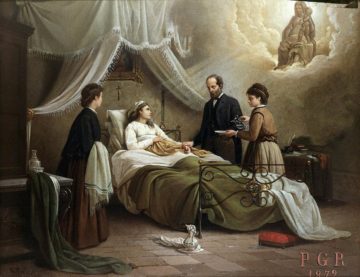Lorraine Boissoneault in Smithsonian:
 The pain struck suddenly in Venice.
The pain struck suddenly in Venice.
Writing to her doctor brother-in-law in 1839, famed British writer Harriet Martineau complained of the “inability to stand or walk, aching and weariness of the back, extending down the legs to the heels” and “tenderness and pain, on pressure, in the left groin, extending by the hip to the back.” She’d been traveling through Europe with a group of friends for several months, but now it seemed the completion of her adventures would have to be put on hold.
Within weeks, Martineau was back in England, where she was diagnosed with a retroverted uterus and polypus tumors: two vaguely defined conditions without a cure. (These ailments would likely be diagnosed differently today, but modern scholars often shy away from definitively diagnosing historical figures due to the difficulty of doing so with limited information.) As for treatments, the most Martineau could hope for was iodide of iron for “purifying the blood,” morphine for the pain and the general cure-all treatment of bloodletting. Resigning herself to an illness of unknown duration, Martineau moved to Tynemouth, a town on the northeastern coast of England, and hired nurses and servants to care for her in this new sickroom. She would remain there for the next five years, largely unable to leave due to the pain of walking.
More here.
